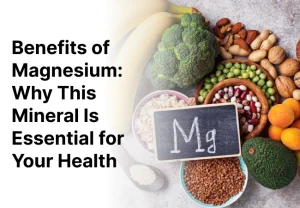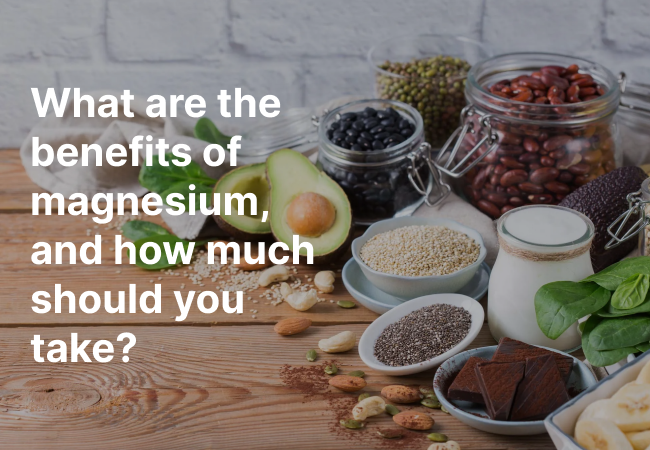What are the benefits of magnesium, and how much should you take?
In the world of nutrients, vitamins, and supplements, magnesium is finally getting the attention it deserves. For years, it’s been the unsung hero of good health — overlooked, underappreciated, and often forgotten.
But that’s changing.
Today, more people are learning just how vital magnesium for health really is. From better sleep to stronger bones, the magnesium benefits are too good to ignore.
So, why the sudden buzz around this essential mineral? Consider adding magnesium supplements to your daily routine. Let’s dive in.
What Is Magnesium?

Magnesium is a crucial mineral your body needs to stay healthy and function well. It plays a role in more than 300 chemical reactions that keep your body running smoothly.
You need magnesium for:
- A healthy cardiovascular system
- Strong bones and muscles
- Proper nerve function
- Balanced blood sugar levels
- Normal blood pressure
- Efficient protein production
In short, magnesium keeps your heart beating, your muscles moving, and your brain sharp.
Benefits of Magnesium: Why This Mineral Is Essential for Your Health

Magnesium is often overlooked when we talk about essential minerals for the body. Yet, it plays a vital role in nearly every system. Understanding the magnesium benefits helps answer what magnesium does for the human body. Here are eight key ways magnesium supports your health.
1. Supports Optimal Brain Function
Your brain and nerves rely on magnesium for brain function. It regulates neurotransmitters, the chemicals that transmit messages across your nervous system.
Magnesium helps maintain regular brain activity. This supports learning, memory, and emotional stability. Adequate magnesium levels also improve focus and cognitive performance.
2. Promotes a Steady Heartbeat
A healthy heartbeat depends on magnesium for heart health. It regulates calcium, which is essential for heart muscle contractions.
Sufficient magnesium maintains a normal heart rhythm and reduces the risk of arrhythmia or irregular heartbeats. This is a key magnesium health benefit for cardiovascular function.
3. Lowers the Risk of Heart Disease
Magnesium contributes to overall heart health. It helps regulate cholesterol, reduce blood pressure, and prevent artery calcification.
By supporting these functions, magnesium lowers the risk of chronic cardiovascular disease. This makes it an essential mineral for anyone focused on magnesium and heart health.
4. Regulates Muscle Function
Magnesium helps muscles work smoothly by supporting both contraction and relaxation. This is why magnesium for muscles is so essential, especially for athletes and active individuals.
Magnesium prevents muscle cramps and spasms. Adequate magnesium also supports endurance and reduces post-workout soreness.
5. Helps Lower Blood Pressure
Studies show that magnesium supplements can help reduce high blood pressure.
Magnesium relaxes blood vessels, naturally lowering blood pressure levels. This is particularly helpful for people managing hypertension and supporting overall heart health.
6. Supports Blood Sugar Management in Type 2 Diabetes
Magnesium helps regulate insulin and maintain healthy glucose levels.
For people with Type 2 diabetes, magnesium supplements or a diet rich in magnesium can improve blood sugar regulation. This contributes to better metabolic health and overall well-being.
7. Improves Sleep Quality
Magnesium calms the nervous system, supporting better rest. Magnesium for sleep helps regulate melatonin, the hormone that controls the sleep-wake cycle.
It relaxes both mind and body, promoting longer and deeper sleep. This is one of the most widely recognised magnesium benefits.
8. Supports Mood and Emotional Health
Low magnesium levels are linked to higher risks of depression. Magnesium helps produce serotonin, the neurotransmitter that regulates mood.
Maintaining healthy magnesium levels can improve emotional stability and reduce symptoms of depression. This makes magnesium a natural tool for mental wellness.
How Much Magnesium Is Needed Daily?
The recommended dietary allowance (RDA) includes the magnesium you get from both the food you eat and any supplements you take.
Category Recommended Dietary Allowance (RDA)
CHILDREN
1-3 years 80 milligrams/day
4-8 years 130 milligrams/day
9-13 years 240 milligrams/day
FEMALES
14-18 years 360 milligrams/day
19-30 years 310 milligrams/day
31 years and over 320 milligrams/day
Pregnant Under 19 years: 400 milligrams/day
19 to 30 years: 350 milligrams/day
31 years and up: 360 milligrams/day
Breastfeeding Under 19 years: 360 milligrams/day
19 to 30 years: 310 milligrams/day
31 years and up: 320 milligrams/day
MALES
14-18 years 410 milligrams/day
19-30 years 400 milligrams/day
31 years and up 420 milligrams/day
Low Magnesium Symptoms: How to Recognise and Treat Magnesium Deficiency
Magnesium is a vital mineral for your body. When levels drop too low, it can lead to noticeable low magnesium symptoms. This condition, also called hypomagnesemia, affects many body systems and can impact your overall health. Understanding magnesium deficiency symptoms helps you take action early.
Common Symptoms of Low Magnesium
Mild magnesium deficiency symptoms can be subtle and often overlooked. These include:
- Nausea (magnesium and nausea)
- Fatigue (magnesium and fatigue)
- Reduced appetite (magnesium and appetite loss)
These early signs are often mistaken for other conditions, such as a stomach bug or medication side effects.
Severe deficiency can lead to:
- Numbness or tingling in arms and legs (magnesium and numbness)
- Muscle cramps or spasms (magnesium and muscle cramps)
- Abnormal heart rhythm (magnesium and abnormal heart rhythm)
Recognising these signs early is essential to prevent complications.
Causes of Magnesium Deficiency
Several factors contribute to magnesium deficiency:
- Malnutrition or low magnesium intake (malnutrition and magnesium deficiency)
- Gastrointestinal conditions like Crohn’s disease that impair absorption (gastrointestinal conditions and magnesium, Crohn’s disease and magnesium absorption)
- Kidney disease, which can increase magnesium loss (kidney disease and magnesium loss)
- Certain medications, such as diuretics or chemotherapy (medications causing magnesium deficiency, diuretics and magnesium, chemotherapy and magnesium deficiency)
- Alcohol use disorder, which accelerates magnesium loss (alcohol use and magnesium loss)
Understanding these causes helps identify at-risk individuals and take corrective action.
Too Much Magnesium: Symptoms, Causes, and Risks of Hypermagnesemia
Magnesium is an essential mineral for your body. It supports muscles, nerves, heart health, and energy production. But taking too much can lead to too much magnesium, also known as hypermagnesemia. Recognising these symptoms early can prevent serious health complications.
Common Symptoms of Hypermagnesemia
Symptoms of hypermagnesemia often develop gradually. Early signs may include:
- Nausea (magnesium and nausea)
- Headache (magnesium and headache)
- Muscle weakness (magnesium and muscle weakness)
- Trouble breathing (magnesium and trouble breathing)
These signs indicate that magnesium levels are higher than usual. Severe cases require immediate medical attention.
Who Is at Risk for High Magnesium?
Hypermagnesemia is rare in healthy individuals. Most cases occur due to underlying health issues or excessive intake. Common causes include:
- Kidney failure: Kidneys regulate magnesium levels. Failure can lead to magnesium excess (kidney failure and magnesium).
- Excessive magnesium intake: Taking too many magnesium supplements can cause toxicity (magnesium supplements overdose, magnesium supplementation).
- Magnesium-containing medications: Laxatives or antacids may increase magnesium levels (magnesium-containing laxatives).
Understanding these risk factors is essential to preventing magnesium toxicity.
Magnesium-Rich Foods and Supplements
Magnesium is a vital mineral your body needs for muscles, nerves, heart health, and energy. Including magnesium-rich foods in your diet is the best way to enjoy magnesium benefits and maintain proper magnesium intake.
Top Magnesium Sources in Foods
Adding green leafy vegetables like spinach to meals is an easy way to increase magnesium. Other excellent magnesium sources include:
- Beans and legumes
- Nuts such as almonds and cashews
- Whole grains like brown rice and quinoa
- Pumpkin seeds
- Soy milk
- Bananas
- Dark chocolate (in moderation)
Eating one serving of spinach, an ounce of almonds, and a banana provides about 190 mg of magnesium. That’s nearly 60% of the magnesium daily recommendation for women and 45% for men.
A diet rich in foods high in magnesium, such as the Mediterranean diet, usually provides all the magnesium your body needs. Focusing on magnesium nutrition through natural foods maximises magnesium benefits safely.
When to Consider Magnesium Supplements
Not everyone needs magnesium supplements. They are generally recommended for people with a diagnosed magnesium deficiency or specific conditions. Examples include:
- Preeclampsia and magnesium support
- Crohn’s disease and magnesium absorption issues
For conditions like insomnia or migraine headaches, magnesium supplements may help improve sleep and reduce symptoms. Always check with your doctor before starting any supplements to stay safe.
Summary
Magnesium plays a vital role in keeping your body healthy. It supports heart function, strengthens bones, and regulates blood pressure. Many people fall short in magnesium nutrition, which can increase the risk of osteoporosis, inflammation, and other health issues.
Consuming magnesium-rich foods like green leafy vegetables, nuts, beans, and whole-grain cereals is the best way to get the mineral. Magnesium supplements are helpful only when necessary. Following this approach ensures safe magnesium health benefits and maintains overall wellness.
Popular Post
Recent Post
How much protein does your body really need each day?
Protein: The Building Block of Life Proteins are the essential building blocks that make up your body. They help you grow, repair, and stay strong. Every part of your body—muscles, tendons, organs, and skin—relies on protein. But protein does more than build your body. It also helps create enzymes, hormones, and neurotransmitters—tiny molecules that keep […]
Tongue Bumps: Common Causes and Effective Treatments
Ever notice small bumps on your tongue and wonder what caused them? Don’t worry — you’re not alone. Tongue bumps are common and often harmless. But sometimes, they can signal something more serious, like an infection, allergy, or injury that needs attention. Let’s break it down in simple terms. What Are Tongue Bumps? Your tongue […]
What are the benefits of magnesium, and how much should you take?
In the world of nutrients, vitamins, and supplements, magnesium is finally getting the attention it deserves. For years, it’s been the unsung hero of good health — overlooked, underappreciated, and often forgotten. But that’s changing. Today, more people are learning just how vital magnesium for health really is. From better sleep to stronger bones, the […]


